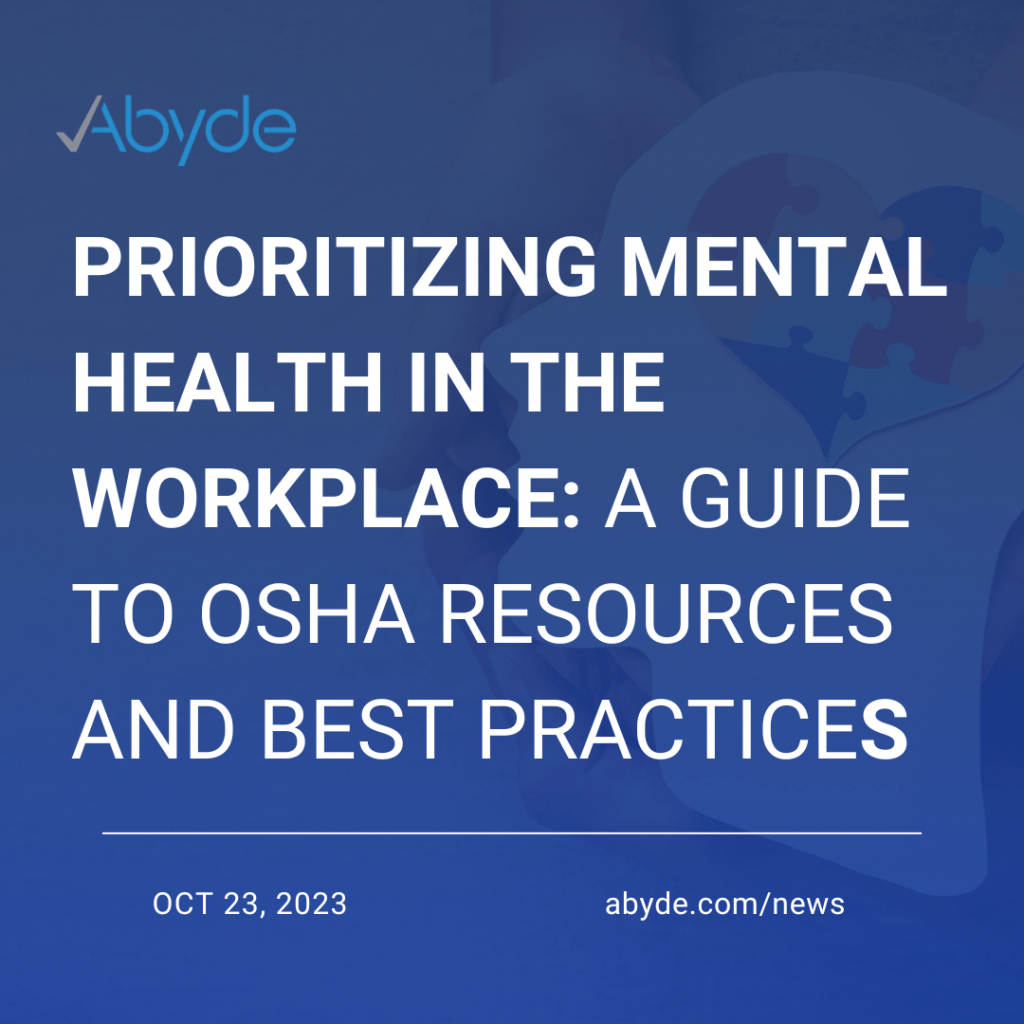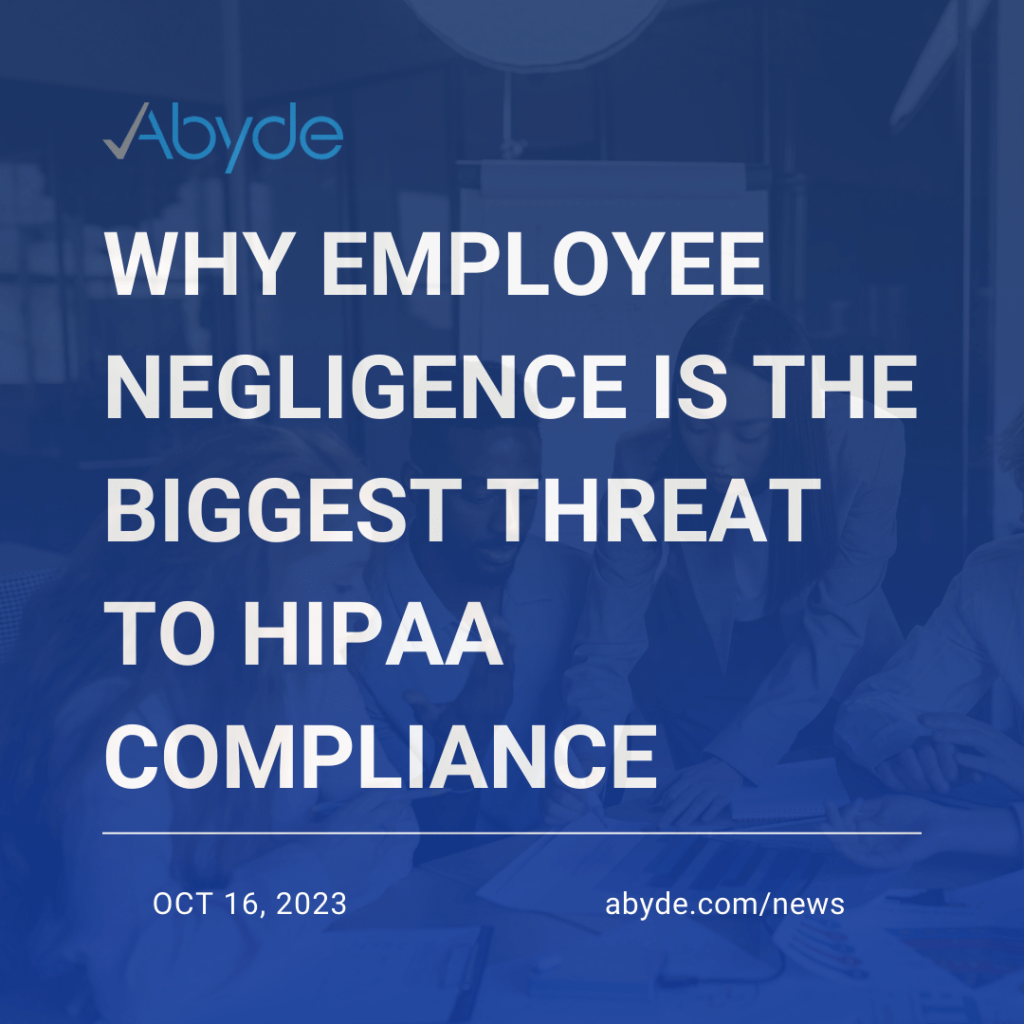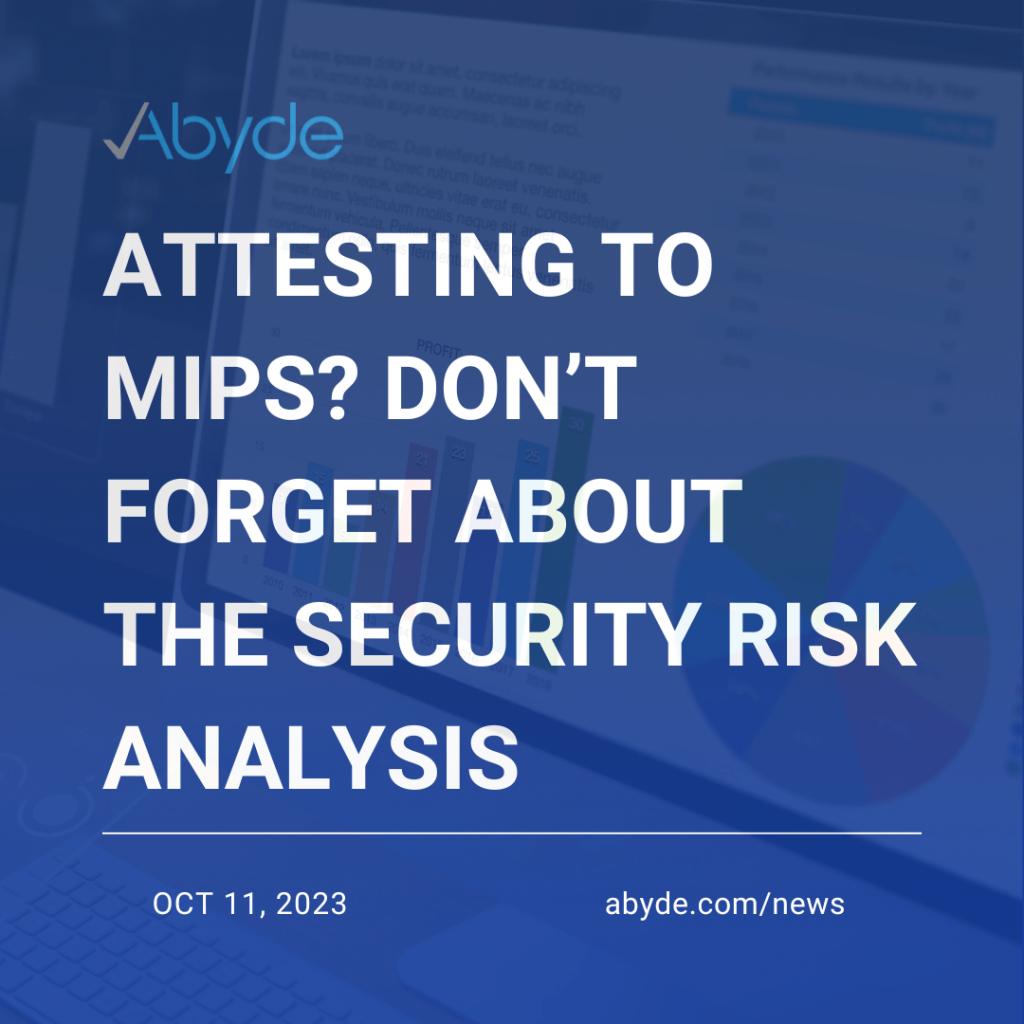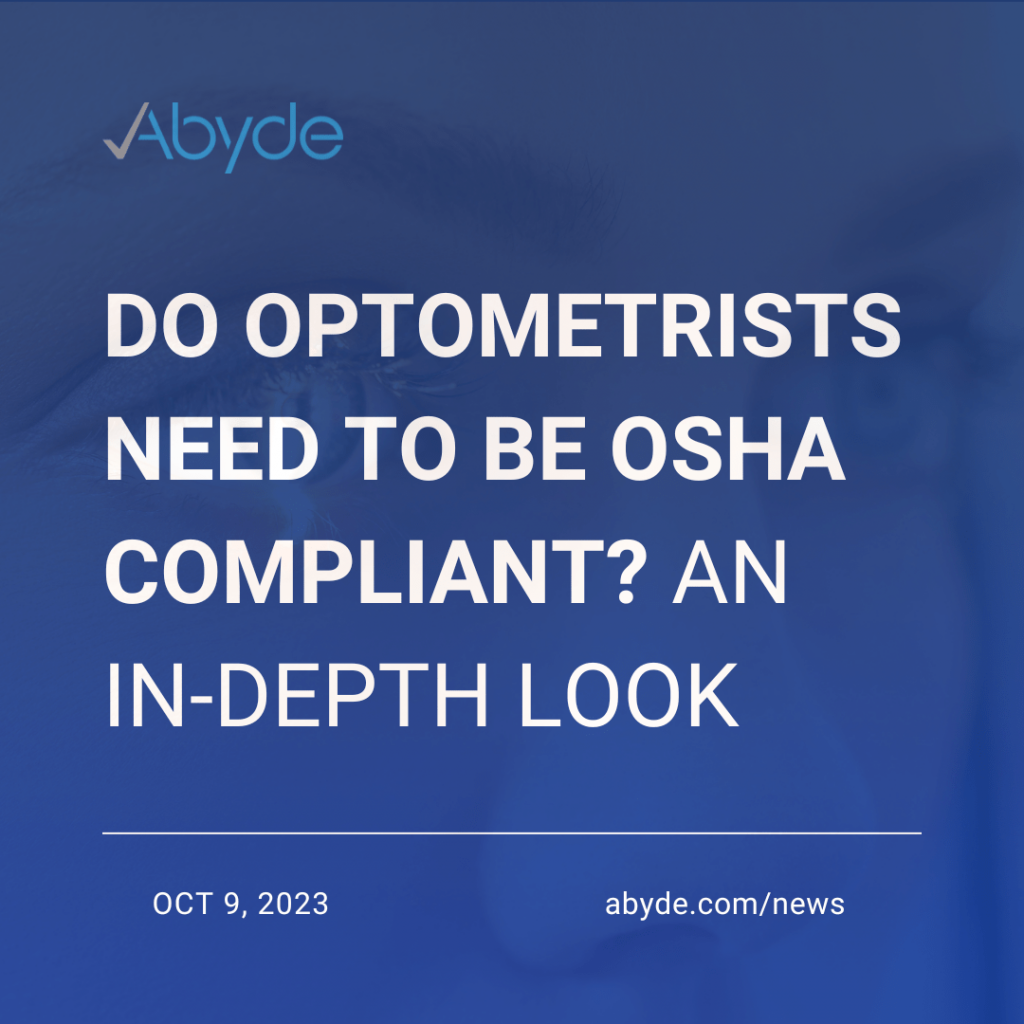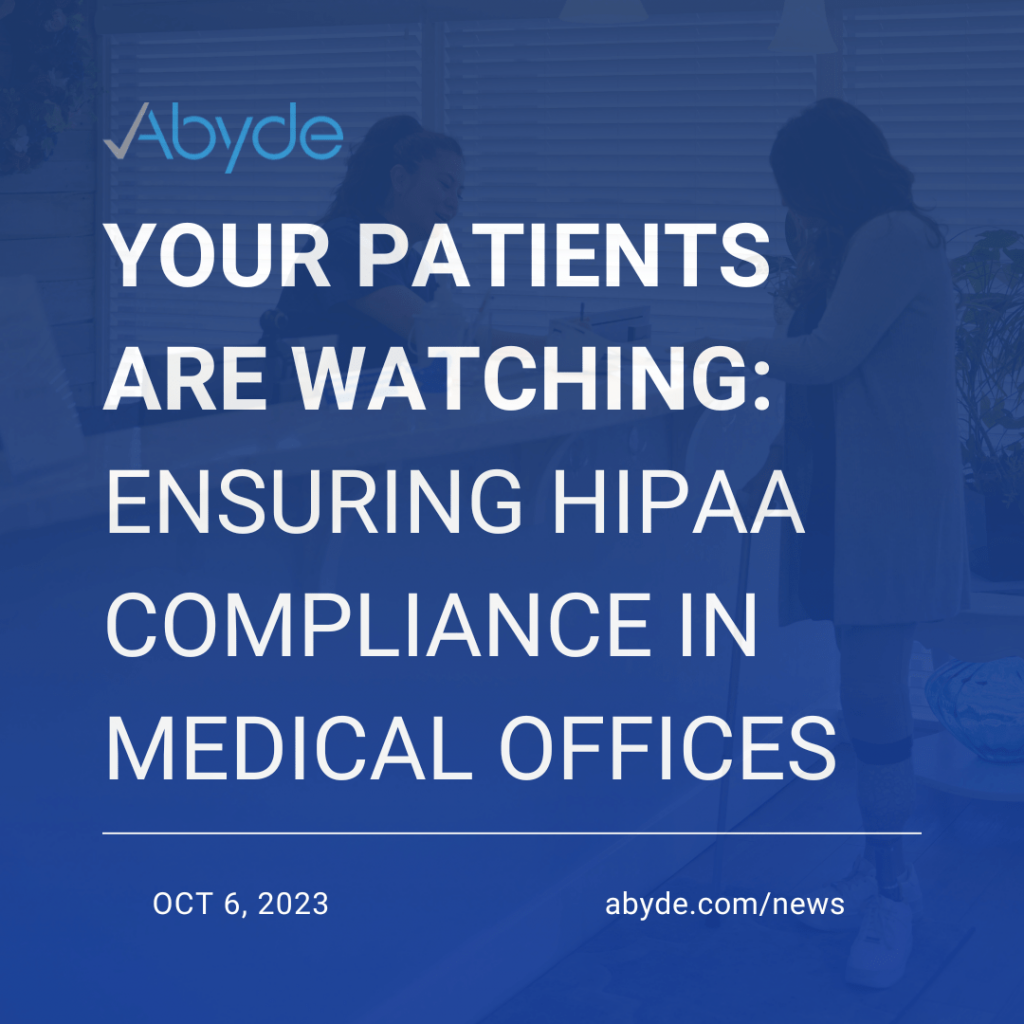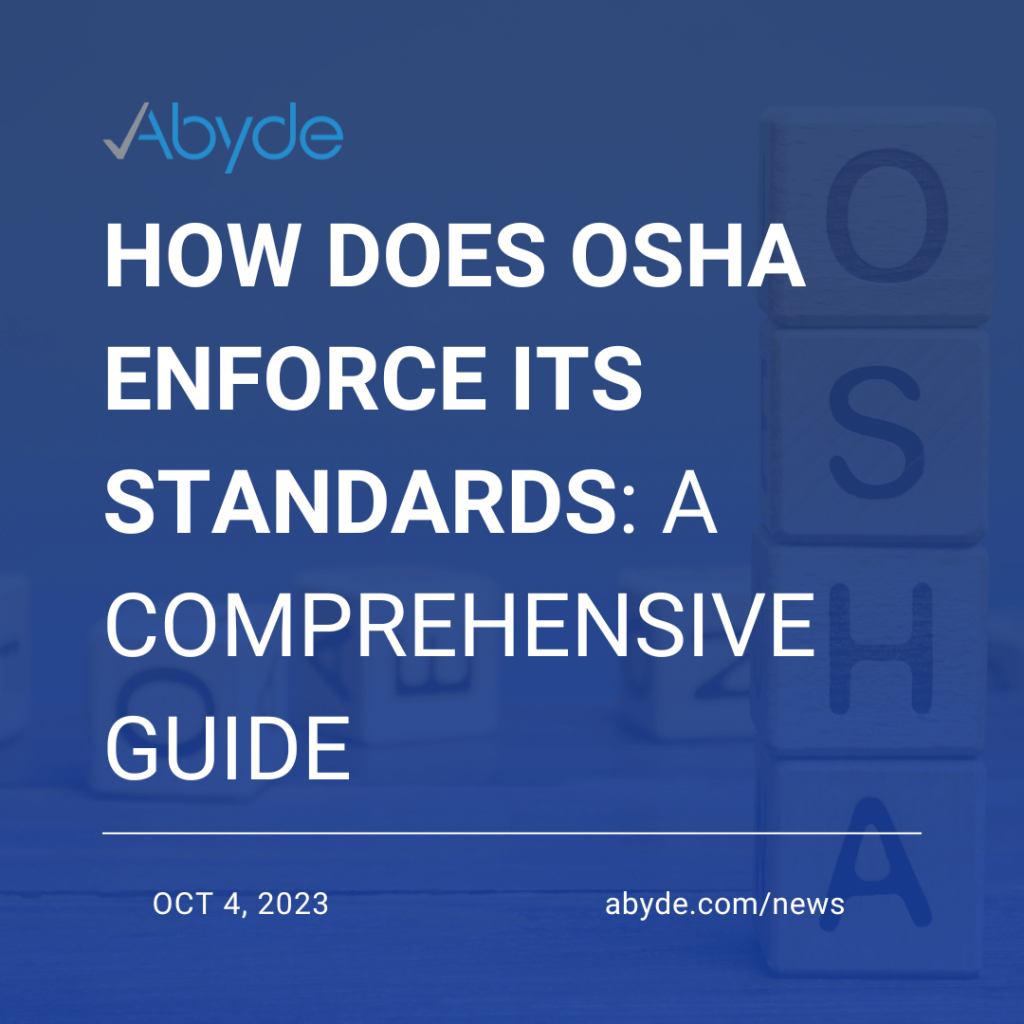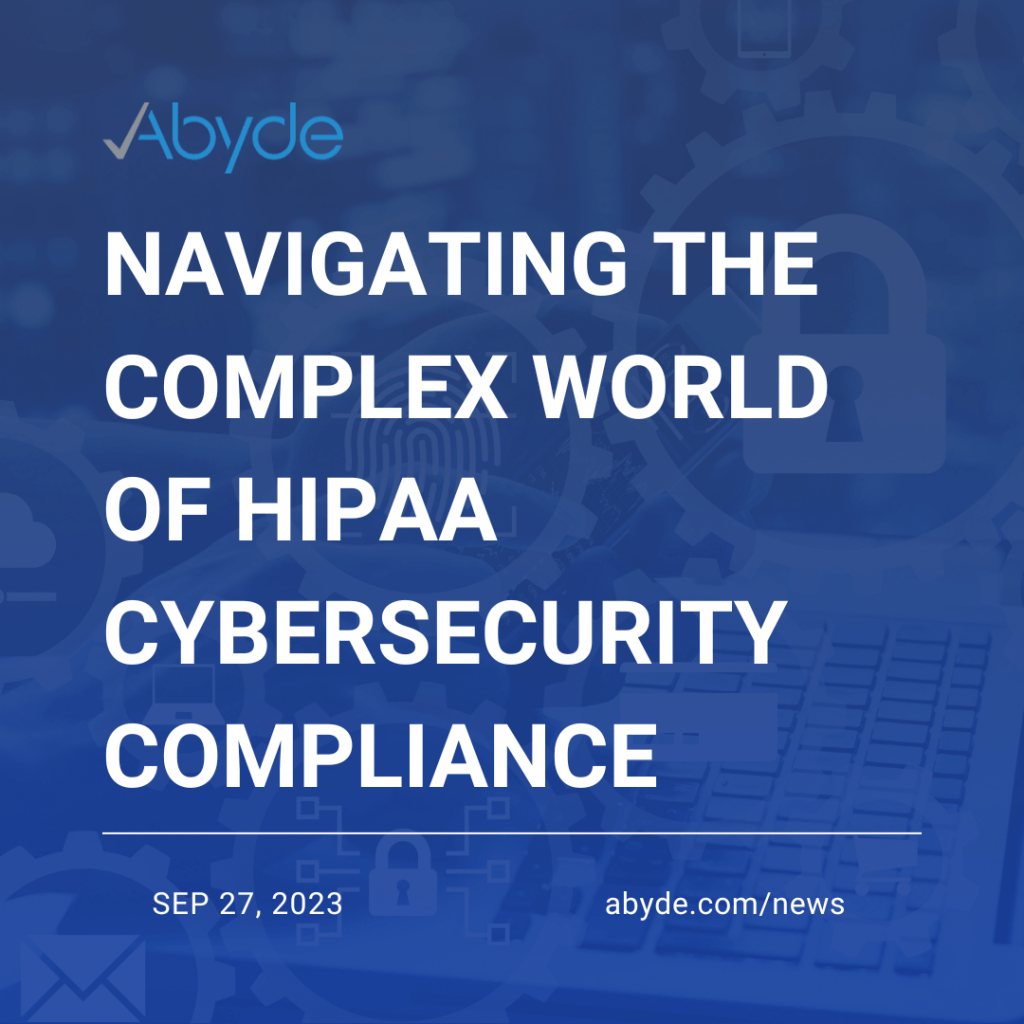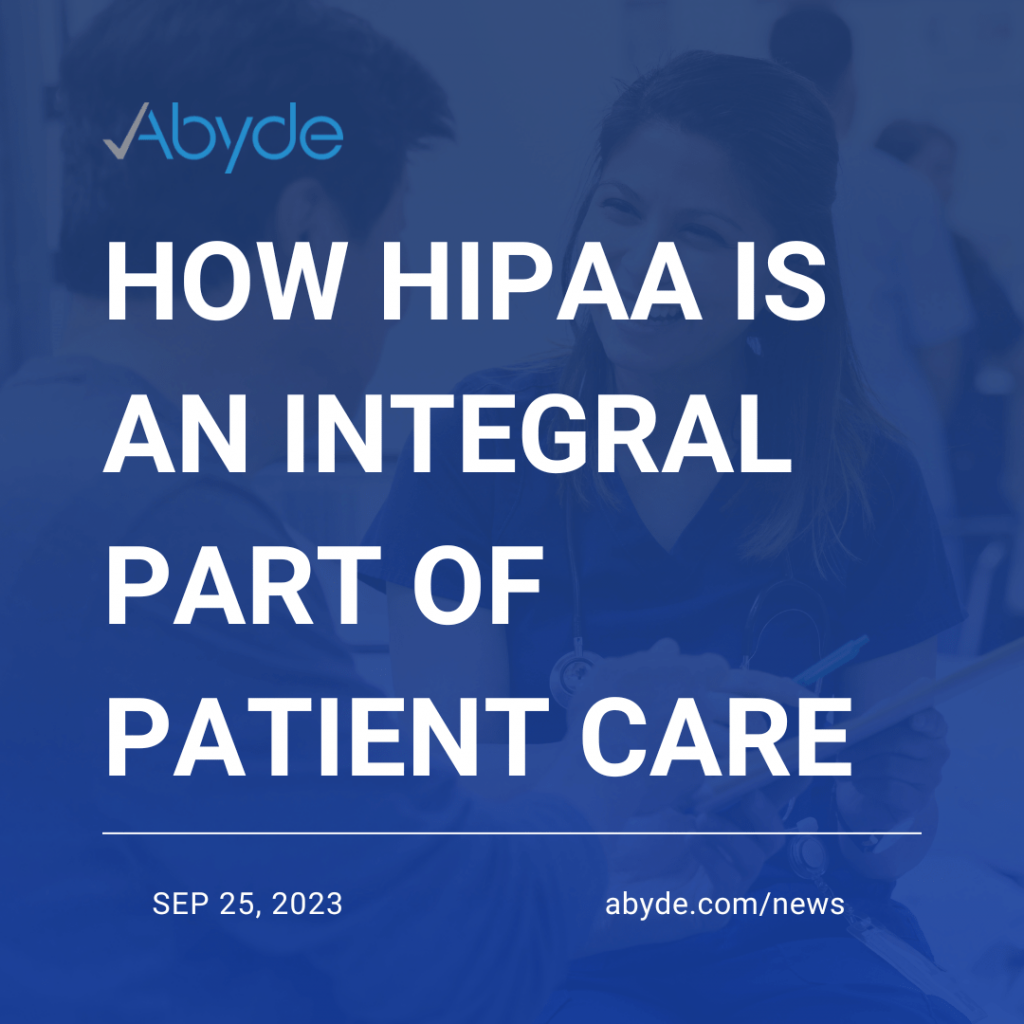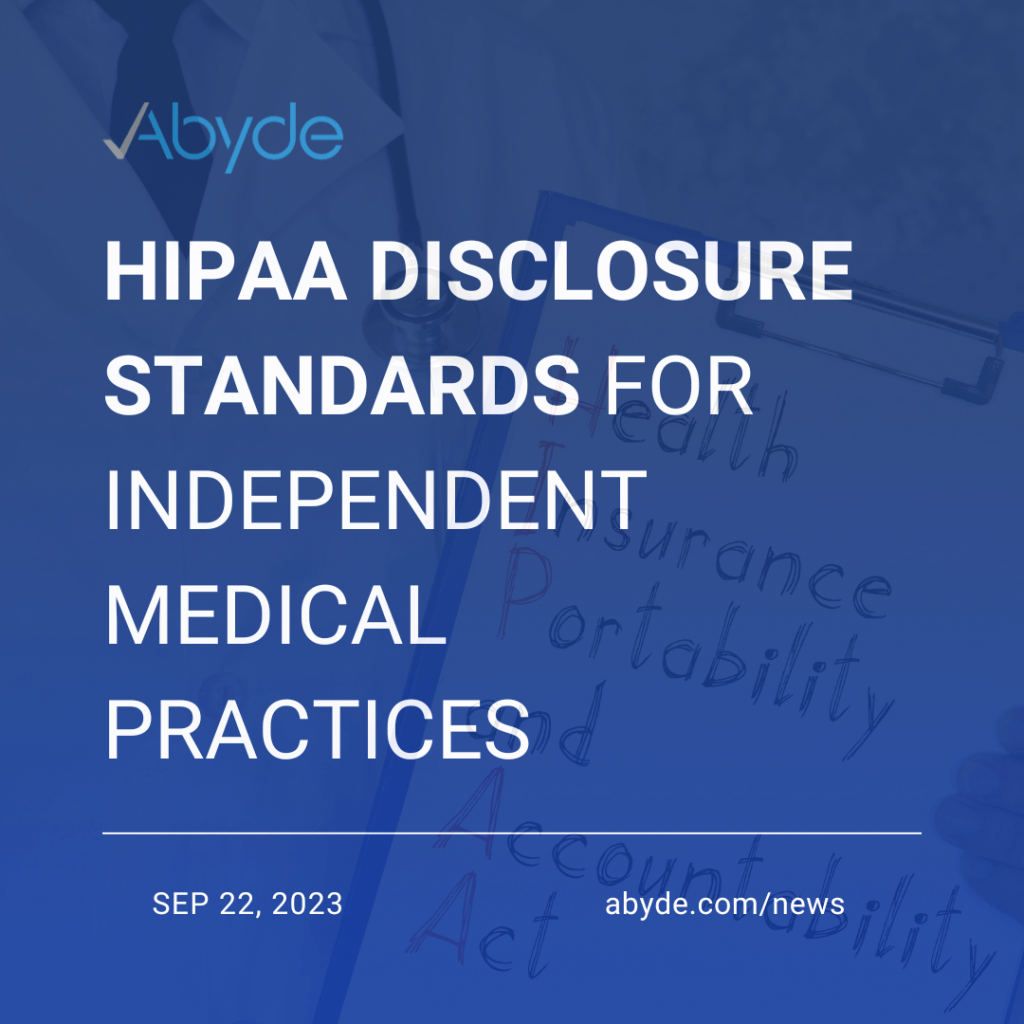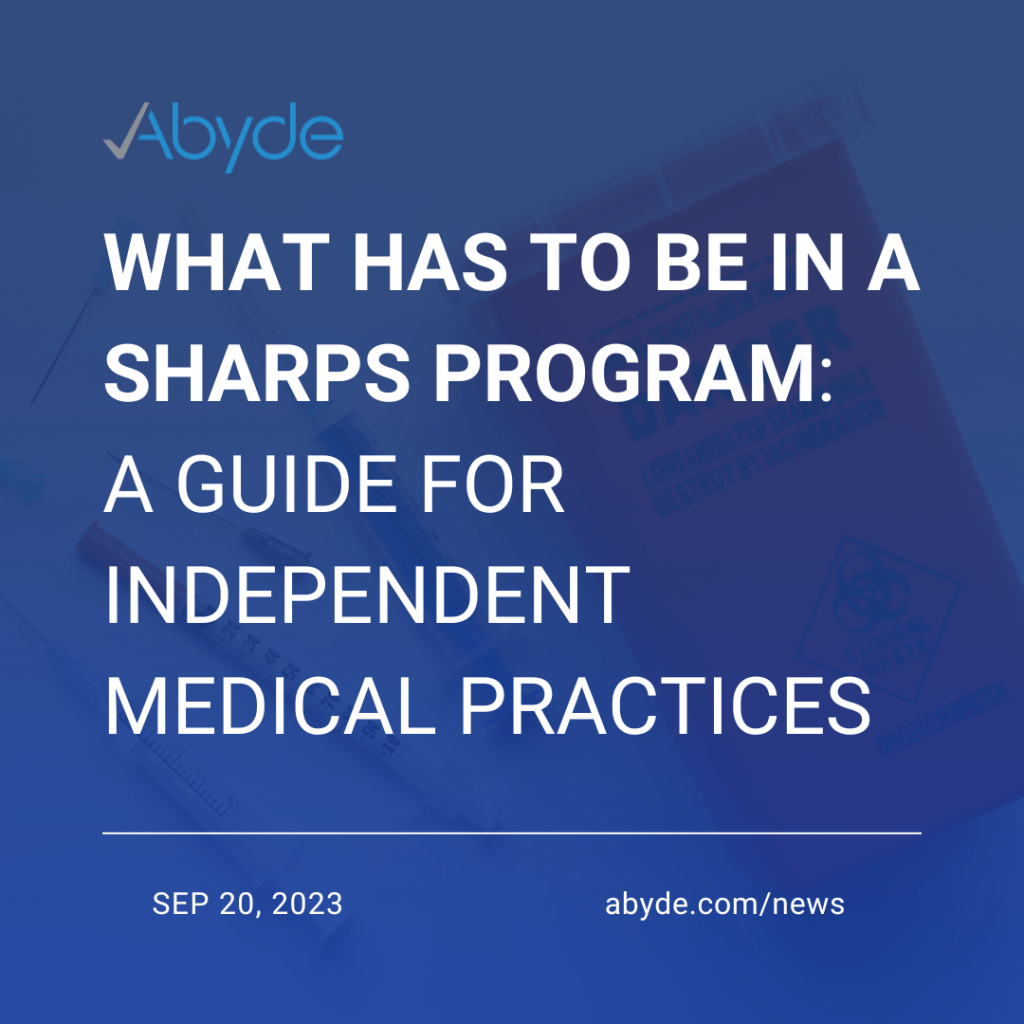October 23, 2023 The modern workplace can often be a breeding ground for stress, anxiety, and other mental health concerns. In fact, 80% of employees experience some form of stress at work. Mental well-being can take a backseat as employers and workers grapple with deadlines, interpersonal conflicts, and work-life balance. However, it’s essential to prioritize mental health for overall productivity and harmony within an organization. Abyde, a leader in HIPAA and OSHA compliance solutions, aims to shed light on the importance of this topic and the valuable resources provided by the Occupational Safety and Health Administration (OSHA) to help organizations build a healthier work environment. The Importance of Mental Health Awareness Talking openly about mental health is the first step toward reducing the stigma surrounding it. Employers, unions, and worker organizations have a vital role to play in this discourse. From educational initiatives to supportive policies, these bodies should invest in strategies that focus on: OSHA Resources to Support Workplace Mental Health Support One Another Toolkit This toolkit provides comprehensive guidelines for creating a workplace culture encourages mental health discussions. Available in both English and Spanish, it is an excellent resource for initiating dialogues around mental well-being. Working Together Poster A handy resource for employers and workers alike, this poster outlines the essential steps to address workplace stress and mental health issues effectively. Supporting Your Co-Workers Poster Compassion and understanding are essential when talking about mental health. This poster offers concrete tips on approaching such sensitive topics respectfully, listening empathetically, and providing meaningful support to co-workers. Worker-Fatigue Webpage Worker fatigue is often a precursor to more serious mental health concerns. OSHA’s dedicated webpage on this issue includes information on the impact of demanding work schedules and offers recommendations for preventing fatigue-related injuries and illnesses. Helping Your Co-Workers and Yourself Poster Focusing on mutual support, this poster provides general tips and advice for employers and employees to help each other cope with stress and mental health challenges. Building an Awareness Campaign The resources mentioned above can serve as building blocks for an effective mental health awareness campaign within your organization. OSHA also has written a guide for managers discussing mental health challenges with their employees. Employers can customize these resources to suit their specific workplace environment and challenges. Final Thought Promoting mental health in the workplace is a collective responsibility requiring concerted efforts from employers, workers, and organizations. Utilizing the resources provided by OSHA can help lay a strong foundation for a mentally healthy work environment. Integrating these OSHA resources into your workplace policies and practices ensures a healthier, more productive team and remains compliant with safety and health standards, a win-win situation for all. For more information on how to make your workplace OSHA-compliant and employee-friendly, visit Abyde. We offer comprehensive solutions that effortlessly ensure you meet all health and safety standards.
Why Employee Negligence is the Biggest Threat to HIPAA Compliance
October 16, 2023 Welcome to another edition of Abyde’s insights into the complex world of healthcare compliance. As HIPAA and OSHA compliance experts, we understand the numerous challenges healthcare providers face. Today, we’ll delve into a topic that doesn’t receive as much attention as it should: the role of employee negligence in undermining HIPAA compliance. While advanced cybersecurity measures and secure data storage are essential, human error remains the most significant threat to your organization’s HIPAA compliance. The Human Factor Employees are your front-line defense against breaches and violations. Whether it’s mishandling patient records, failing to encrypt sensitive data correctly, or clicking on phishing emails, the human element poses a unique set of challenges. According to a report by Cybersecurity Insiders, over 60% of organizations identify employee negligence as the most significant risk factor. Common Types of Negligence Inadequate Training Lack of proper training on HIPAA regulations and protocols is often the root cause of negligence. A well-trained workforce is crucial to minimizing errors. Poor Password Management Employees often use weak passwords or reuse passwords across platforms. The implementation of strong password protocols can prevent unauthorized access. Sharing Information One of the most common types of employee negligence is sharing sensitive patient data, whether intentionally or unintentionally. The HIPAA Privacy Rule clearly outlines the guidelines for sharing Protected Health Information (PHI). Consequences of Negligence Financial Penalties Failing to comply with HIPAA can result in hefty fines, ranging from $100 to $50,000 per violation, according to the U.S. Department of Health & Human Services. Legal Repercussions Depending on the severity of the violation, legal action may be taken against the healthcare provider, leading to a damaged reputation and loss of trust. Data Breaches Negligence can lead to data breaches that may require public disclosure, further eroding patient trust and damaging your reputation. Mitigating the Risk Comprehensive Training Programs Regular and rigorous training can significantly reduce instances of employee negligence. Abyde’s HIPAA training solutions can offer a robust program designed to keep your staff informed and compliant. Technology Solutions Leverage technology to minimize the impact of human error. Software solutions like Abyde can provide real-time monitoring and alerts for any compliance issues. Regular Audits Frequent internal audits can identify potential areas of concern before they become major issues. For more on how to perform these audits, check out our resources section here. Final Thought While external threats are a concern, the biggest threat to HIPAA compliance often comes from within. By focusing on comprehensive training and leveraging technology, you can mitigate the risks posed by employee negligence. Trust Abyde to provide you with the tools and expertise to ensure that your organization remains compliant and secure. Contact us today for more information on how Abyde can assist with your HIPAA compliance needs.
Attesting to MIPS? Don’t forget about the Security Risk Analysis
October 11, 2023 It’s your practice’s responsibility to get the SRA done, not your EHR The Merit-Based Incentive Payment System (MIPS) is a Medicare program that rewards eligible clinicians and groups for providing high-quality, cost-effective care. MIPS is a value-based payment program, which means that it ties payments to performance on quality measures, promoting interoperability, improvement activities, and cost. Eye care practices are eligible to participate in MIPS, and they can earn financial incentives for performing well on the program’s measures. One of the most important measures in MIPS is the Security Risk Analysis (SRA). The SRA is a process that helps eye care practices identify and mitigate security risks to their patients’ protected health information (PHI). The SRA must be conducted annually, and MIPS-eligible clinicians must attest to completing an SRA in order to receive a score for the Promoting Interoperability performance category. There are many reasons why SRAs are important for eye care practices. First, SRAs help practices comply with the Health Insurance Portability and Accountability Act (HIPAA), which requires covered entities to protect the privacy and security of PHI. Second, SRAs can help practices avoid costly and damaging data breaches. Data breaches can have a significant financial impact on eye care practices. In addition to the direct costs of responding to a breach, practices may also face lost revenue, reputational damage, and liability lawsuits. SRAs can help eye care practices to avoid data breaches by identifying and addressing security risks. The SRA process involves assessing the practice’s physical, technical, and administrative safeguards and implementing corrective actions to address any identified deficiencies. In addition to helping practices comply with HIPAA and avoid data breaches, SRAs can also help practices improve their overall security posture. By regularly conducting SRAs, practices can identify and address new security threats as they emerge. Eye care practices can conduct SRAs on their own, or they can hire a qualified third party to assist them. There are many resources available to help practices conduct SRAs, including the CMS website, the HIPAA Security Rule website, and the ONC website. Here are some tips for eye care practices conducting SRAs: By conducting regular SRAs, eye care practices can protect their patients’ PHI, avoid costly data breaches, and improve their overall security posture. Need help or have questions? Click here to schedule a complimentary compliance consultation with an expert today!
Do Optometrists Need to be OSHA Compliant? An In-Depth Look
October 9, 2023 In the healthcare sector, there’s often a misconception that only large hospitals or medical practices must concern themselves with compliance standards. This is far from the truth, especially regarding regulations like those set forth by the Occupational Safety and Health Administration (OSHA). So, where do optometrists fall on the compliance spectrum? What is OSHA? The Occupational Safety and Health Administration (OSHA) is a branch of the United States Department of Labor that sets guidelines and standards to ensure safe and healthy working conditions. OSHA regulations encompass a variety of industries, including healthcare, construction, manufacturing, and more. OSHA Regulations and Optometry Practices OSHA regulations apply to any workplace where there is a potential for injury or illness. In an optometry office, employees are exposed to various risks, ranging from potentially hazardous chemicals used for cleaning lenses to sharp objects like needles or scalpel blades that might be used in minor procedures. Key Areas of Compliance for Optometrists Penalties for Non-Compliance Non-compliance could result in significant financial penalties and even temporary or permanent closure of the practice. OSHA regularly conducts inspections, and failure to meet the standards can result in hefty fines, which can severely affect the financial stability and reputation of the practice. Are There Any Exemptions? There are very few exemptions to OSHA compliance. Even if an optometry practice has few employees, they must usually adhere to OSHA regulations. Optometrists must ensure they are fully aware of and in compliance with all relevant OSHA regulations to avoid penalties and maintain a safe work environment. Conclusion In summary, the need for OSHA compliance in optometry practices is not just a recommendation—it’s a legal requirement. Ignoring these standards puts your practice at risk for penalties and jeopardizes the safety of your employees and patients. How Can Abyde Help? Navigating through the complex web of OSHA compliance can be overwhelming. That’s where Abyde comes in. We specialize in HIPAA and OSHA Compliance solutions for healthcare providers. Our software can guide you through the process, ensuring that your optometry practice remains compliant without taking up much time. Take the first step toward full OSHA compliance today. Visit our website to schedule a free consultation and discover how Abyde can make compliance hassle-free for your practice. Resources
Your Patients Are Watching: Ensuring HIPAA Compliance in Medical Offices
October 6, 2023 The Health Insurance Portability and Accountability Act (HIPAA) is not just a set of guidelines that medical practices must follow to avoid fines and penalties; it’s a standard for patient care. Patients are well-informed about the importance of data privacy and security in an increasingly digital world. They are vigilant and observant, carefully watching how medical offices manage their confidential information. Hence, maintaining HIPAA compliance is a regulatory necessity and a way to gain patient trust and satisfaction. Below are some tips and tricks to ensure you stay HIPAA compliant when patients are watching. Signs Your Patients Are Monitoring HIPAA Compliance Tips and Tricks for Ensuring HIPAA Compliance Clear Communication with Patients Train Your Staff Physical Environment Tech-Savvy Measures Documentation Patient Feedback HIPAA compliance is a shared responsibility between healthcare providers and their staff. When your patients see you taking steps to protect their privacy and uphold the law, it builds trust, which is priceless in healthcare. Keeping an eye on these elements will help you stay compliant and make your patients feel secure and respected. How Abyde Can Help Risk Analysis Abyde provides a thorough Risk Analysis that helps identify potential vulnerabilities in your healthcare practice. The software can pinpoint where compliance might fall short and recommend specific actions to remedy these issues. Staff Training Abyde offers built-in staff training modules aimed at making your team HIPAA-savvy. Your staff must know the ins and outs of HIPAA, and training them with Abyde ensures you’re covering all your bases. Real-time Monitoring One of the critical features of Abyde is its real-time monitoring capabilities. It can automatically track activities that may be non-compliant and send alerts so that corrective action can be taken immediately. Documentation and Reporting Compliance is also about being able to prove that you’re compliant. Abyde’s robust reporting capabilities offer comprehensive documentation that can be invaluable during audits or legal scrutiny. Automated Audits Regular audits are a must, and Abyde offers automated solutions for this. It can conduct regular audits without human intervention, saving you time and effort while ensuring compliance is always up to par. Tailored Solutions Every healthcare practice is unique, and Abyde understands this. Its software solutions can be tailored to meet the specific needs of your practice, making compliance more manageable and effective. Additional Resources for HIPAA Compliance Staying HIPAA compliant is not just a legal obligation but a promise of trust and quality that you make to your patients. Abyde can facilitate this process, ensuring you maintain the highest data privacy and security standards. By adhering to HIPAA regulations effectively with Abyde, you not only avoid penalties but also win the trust and loyalty of your patients.
How Does OSHA Enforce Its Standards: A Comprehensive Guide by Abyde
October 4, 2023 Ensuring a safe and healthy workplace is a priority for employers across industries. The Occupational Safety and Health Administration (OSHA) plays a crucial role in setting and enforcing standards aimed at guaranteeing employee safety. But how does OSHA enforce these regulations? In this comprehensive guide, we break down the different mechanisms that OSHA employs to ensure compliance, including inspections, citations, and penalties. The Role of OSHA in Workplace Safety Established by the Occupational Safety and Health Act of 1970, OSHA is a federal agency responsible for maintaining health and safety regulations across workplaces in the United States. Its mission is to “assure safe and healthy working conditions for working men and women” (OSHA). Types of OSHA Inspections One of the primary ways that OSHA enforces its standards is through inspections, which can be categorized into various types: OSHA Citations and Penalties If a violation of OSHA standards is discovered, the agency issues citations that can carry hefty financial penalties. Fines can vary depending on the severity of the violation and can range from thousands to hundreds of thousands of dollars. Employers can contest these citations and may also be subjected to criminal charges in extreme cases (OSHA Penalties). OSHA’s Whistleblower Protections OSHA also enforces 22 federal whistleblower statutes to protect employees who report violations of various workplace safety regulations. This encourages employees to report unsafe conditions without fear of reprisal (OSHA Whistleblower Protection). How Abyde Can Help Ensuring OSHA compliance can be challenging, but you don’t have to do it alone. Abyde provides a comprehensive SaaS solution aimed at simplifying HIPAA and OSHA compliance for healthcare providers. Our platform helps you stay updated with the latest regulations, undergo training, and prepare for potential inspections, ensuring that you meet OSHA’s stringent standards. Conclusion OSHA plays a critical role in enforcing workplace safety standards across various industries. Through inspections, citations, and whistleblower protections, OSHA ensures that employers maintain a safe environment for their workforce. For more information about how Abyde can assist your healthcare organization in meeting OSHA and HIPAA compliance standards, contact us today. References Disclaimer: This article is for informational purposes only and does not serve as legal advice. By providing this guide, Abyde aims to simplify the complex landscape of OSHA enforcement mechanisms, helping healthcare providers focus on what they do best—caring for patients.
Navigating the Complex World of HIPAA Cybersecurity Compliance
September 27, 2023 Healthcare organizations handle a tremendous amount of sensitive data, from patient records to financial information. The Health Insurance Portability and Accountability Act (HIPAA) serves as the regulatory framework that outlines the need for stringent cybersecurity protocols to safeguard this data. Compliance with HIPAA isn’t just a legal obligation; it’s also a critical aspect of building trust with patients and stakeholders. This article will dive deep into the facets of HIPAA cybersecurity compliance, offering a comprehensive guide for healthcare organizations seeking to align with these standards. What is HIPAA? Enacted in 1996, the Health Insurance Portability and Accountability Act (HIPAA) aims to streamline healthcare transactions, reduce healthcare fraud and abuse, and ensure patient information remains confidential. Over time, HIPAA has evolved to address the modern complexities of digital healthcare data, most notably through the Privacy and Security Rules. HIPAA Security Rule The Security Rule outlines the guidelines that healthcare organizations must follow to ensure the confidentiality, integrity, and availability of electronic protected health information (ePHI). It is broken down into three main categories: Importance of Cybersecurity in HIPAA Compliance Cybersecurity in healthcare is not just about preventing unauthorized access; it’s about building a layered defense mechanism that addresses vulnerabilities across various entry points. Failing to comply can result in hefty fines, legal repercussions, and loss of reputation. Core Principles for Compliance Risk Analysis and Management HIPAA requires healthcare entities to conduct periodic risk analyses to identify potential vulnerabilities. Effective risk management plans should include a multi-layered security approach, such as the use of firewalls, antivirus programs, and encryption protocols. Abyde: Your HIPAA Compliance Partner Navigating the intricacies of HIPAA compliance can be daunting. That’s where Abyde comes in. As a leading HIPAA and OSHA Compliance SAAS Company, Abyde offers HIPAA-compliant software designed to simplify compliance, enabling healthcare organizations to focus on what they do best—providing quality care. With features like automated risk assessments, staff training modules, and continuous compliance monitoring, Abyde is the go-to solution for any organization seeking to secure its electronic healthcare data while adhering to regulatory standards. Employee Training Employees often serve as the first line of defense against cyberattacks. Organizations should provide regular training on recognizing phishing emails, using strong passwords, and securing mobile devices with ePHI access. Access Control Under HIPAA guidelines, only authorized individuals should have access to ePHI. This requires stringent access controls, including unique user identifications, emergency access procedures, and regular audits. Data Encryption Encrypting data in transit and at rest is crucial for protecting sensitive information. While HIPAA does not mandate encryption, it is considered a standard practice in safeguarding ePHI. Incident Response In case of a data breach or unauthorized access, healthcare organizations must have an incident response plan that outlines the steps for reporting the breach, identifying the scope, and taking corrective actions. Tools and Technologies Compliance Monitoring and Audits Maintaining continuous compliance requires ongoing monitoring. Regular internal and external audits can help identify areas of improvement and validate that existing safeguards are adequate. Conclusion HIPAA cybersecurity compliance is a complex but indispensable aspect of healthcare management. By understanding the intricacies of the HIPAA Security Rule and implementing a robust cybersecurity framework, healthcare organizations can protect sensitive data, avoid penalties, and, most importantly, earn the trust of their patients and stakeholders. Given the evolving nature of cybersecurity threats, compliance is not a one-time endeavor but an ongoing commitment. Organizations should always stay updated with the latest HIPAA amendments and cybersecurity best practices to ensure that they remain compliant and secure. Recommended Resources By keeping up-to-date with compliance requirements and embracing a culture of continuous improvement, healthcare organizations can confidently navigate the complicated landscape of HIPAA cybersecurity compliance. Contact Abyde today for a complimentary risk assessment consultation by clicking HERE.
How HIPAA is an Integral Part of Patient Care
September 25, 2023 When discussing the U.S. healthcare system, terms like Electronic Health Records (EHR), patient satisfaction, and telehealth often come to mind. Yet, one aspect that serves as the cornerstone of patient care but only sometimes receives the spotlight it deserves is the Health Insurance Portability and Accountability Act (HIPAA). Established in 1996, HIPAA has been a game-changer in shaping the healthcare landscape, primarily by safeguarding patient information and ensuring health data’s confidentiality, integrity, and availability. This article delves into why HIPAA is not just a legal obligation but an integral part of patient care. The Pillars of HIPAA in Patient Care Privacy and Trust The patient entrusts the provider with their most personal and sensitive information in a healthcare setting. HIPAA ensures that this trust isn’t broken by mandating stringent measures to protect patient data from unauthorized access and disclosure. When patients know their information is safe, they are more likely to share the full extent of their medical history, aiding in more accurate diagnoses and effective treatment plans. Quality of Care When healthcare providers adhere to HIPAA’s security rules, they often employ best practices that go beyond just compliance. For example, accurate and immediate access to patient records allows for a faster and more reliable decision-making process. This directly translates to a higher quality of care, minimizing errors and omissions that could harm patient health. Streamlining Communication HIPAA also lays down the guidelines for the lawful sharing of patient information among different healthcare providers. This proves invaluable in situations where multiple specialists care for a single patient. The seamless and secure exchange of information can speed up the treatment process and ensure that all providers are on the same page, enhancing patient care outcomes. Patient Empowerment One of the lesser-known aspects of HIPAA is that it gives patients the right to access and control how their medical information is used or disclosed. This gives them a more active role in their healthcare journey. Moreover, transferring records securely from one provider to another allows for greater flexibility and choice, making the patient an essential stakeholder in their care. The Technology Angle As healthcare systems continue to adopt more advanced technologies like telehealth services and wearable medical devices, the role of HIPAA becomes even more crucial. These platforms handle massive volumes of sensitive data daily, and HIPAA compliance ensures that technological advancements don’t come at the cost of compromised patient privacy. Conclusion HIPAA isn’t just a set of rules that healthcare organizations must abide by to avoid penalties; it’s a framework that places the patient at the center of healthcare. It helps build trust, assures quality, streamlines communication, empowers patients, and paves the way for technology to serve healthcare needs better. By treating HIPAA compliance as a part of patient care, healthcare providers can foster an environment where both the medical and ethical aspects of care are well-addressed, leading to an improved healthcare experience for all involved. By understanding and embracing the role of HIPAA in patient care, healthcare organizations can go beyond mere compliance to deliver a higher standard of care, which is beneficial for both the patient and the healthcare ecosystem. Contact Abyde today for a complimentary consultation by clicking HERE.
HIPAA Disclosure Standards for Independent Medical Practices
September 22, 2023 Navigating the complexities of HIPAA (Health Insurance Portability and Accountability Act) is essential for independent medical practices. This federal law primarily protects the privacy of patients’ health information, specifically the Protected Health Information (PHI). The HIPAA Privacy Rule sets the foundation for PHI protection, stipulating when and how an independent medical practice can share this information without needing explicit consent from patients. Here’s a breakdown for clarity: 1. Treatment, Payment, and Healthcare Operations (TPO): For independent medical practitioners: 2. Consent-Based Disclosures: Individuals can grant written consent to share their PHI: 3. Public Interest and Benefit Activities: There are situations where PHI can be shared for the broader public interest: HIPAA Disclosure Scenarios for Independent Practices: Understanding these disclosure standards ensures that independent medical practices maintain their patients’ trust and compliance with federal regulations. Abyde: HIPAA and OSHA Compliance Software Abyde is a cloud-based software platform that helps healthcare organizations achieve and maintain compliance with HIPAA and OSHA regulations. Abyde provides a comprehensive suite of tools and resources to help organizations with risk assessments, policy and procedure development, employee training, and documentation. Abyde’s compliance software can help organizations: Abyde’s software is easy to use and can be customized to meet the specific needs of any healthcare organization. Abyde also offers a variety of support resources, including online training, webinars, and 24/7 customer support. How Abyde can help healthcare organizations with HIPAA disclosure Abyde’s HIPAA compliance software can help healthcare organizations with HIPAA disclosure by providing tools and resources to help them: Abyde’s software can also help healthcare organizations to: By using Abyde’s HIPAA compliance software, healthcare organizations can help ensure that all PHI disclosures comply with HIPAA regulations and that patient privacy is protected. Conclusion HIPAA is a complex law, but it is crucial to understand the basics of HIPAA privacy and disclosure rules. Understanding these rules can protect your PHI and help ensure your healthcare information is handled appropriately. How Abyde can help you comply with the three standards of HIPAA disclosure; Contact us today for a complimentary consultation by clicking HERE. Links to appropriate resources
What Has to be in a Sharps Program: A Guide for Independent Medical Practices
September 20, 2023 As an independent medical practice, ensuring the safety of both your patients and your staff should be a top priority. One of the vital components of maintaining safety is the implementation of an effective sharps program. This initiative helps in averting injuries and is a significant step towards fostering a secure healthcare environment. Here’s what needs to be included in your sharps program: 1. Comprehensive Training A. Awareness: Foster a safety culture by educating your team on the potential hazards associated with improper handling of sharps. B. Technique: Training should include proper techniques for handling and disposing of sharps to prevent injuries. 2. Proper Tools and Equipment A. Safety-Engineered Devices: Utilize sharps with safety features such as retractable needles and shielded needle devices. B. Disposal Containers: Ensure the availability of puncture-resistant containers for sharps disposal at every point of use. 3. Clear Policies and Procedures A. Disposal Policy: Create a straightforward policy delineating the correct disposal procedures, emphasizing never to overfill sharps containers. B. Reporting Incidents: Develop a clear pathway for promptly reporting and managing sharps injuries. 4. Encourage a Culture of Safety A. Feedback Loop: Establish an open communication channel where staff can report hazards or suggest improvements without fear of reprisal. B. Regular Audits: Regularly evaluate the efficacy of your sharps program and make necessary adjustments. 5. Emergency Response Plan A. Post-Exposure Protocols: Develop protocols for immediate response in case of an exposure incident, including accessible post-exposure prophylaxis. B. Medical Evaluation: Ensure procedures are in place for a quick medical evaluation and follow-up after a sharps injury. 6. Documentation and Records A. Injury Log: Maintain a sharps injury log to record details of the incidents comprehensively. B. Training Records: Keep updated staff training records to track progress and maintain compliance. Conclusion Implementing a robust sharps program is not just a regulatory requirement but a moral imperative in safeguarding the well-being of your staff and patients. Partner with a trustworthy ally like Abyde, who understands the intricacies of healthcare compliance and takes a step toward a safer, more efficient medical practice today. With Abyde by your side, meeting the sharps program requirements becomes as seamless as ever, giving you peace of mind to focus on what matters most — providing exemplary patient care.
